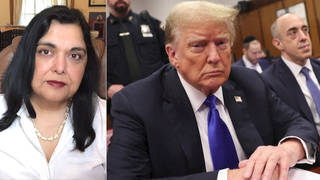
Topics
Guests
- Lee Fanginvestigative reporter at The Intercept covering the intersection of money and politics.
Spending by so-called “dark money” groups—political super PACs and other organizations who can hide their funders—is already far ahead of previous election cycles, with estimates it could reach up to half a billion dollars. Outside spending has surged since the Supreme Court’s 2010 Citizens United decision, which removed limits on campaign spending by ruling that donor money is a form of free speech. We are joined by The Intercept reporter Lee Fang, who’s been following the money trail, from the politicians at the podiums to the money in the shadows.
Transcript
AMY GOODMAN: The road to the White House might begin in Iowa, but in an era of unregulated campaign finance, that road may already have been sold to big donors. Spending by so-called dark money groups—political super PACs and other organizations who can hide their funders—is already far ahead of previous election cycles, with estimates it could reach up to half a billion dollars. Dark money groups have already spent more than $200 million on political ads alone since 2015. Just this weekend, the billionaire Koch brothers held a retreat for their wealthy allies in Palm Springs to discuss political spending and strategy. The Kochs’ political network plans to spend nearly $900 million in 2016, about as much as Democrats and Republicans will spend on their presidential nominees, but they are not a party.
We’re joined by a reporter who’s been following the money trail, from the politicians at the podiums to the money in the shadows. Lee Fang is an investigative journalist at The Intercept covering the intersection of money and politics. Lee Fang, joining us from San Francisco. Still with us, John Nichols, political writer for The Nation, and Ellen Chesler, senior fellow at the Roosevelt Institute, editor of the book Women and Girls Rising: Progress and Resistance Around the World.
Lee, talk about how money played a part in the Iowa caucus.
LEE FANG: Well, Amy, money played a big role. We’ve seen television, radio, direct mail just absolutely flooding the state, trying to convince voters to support certain candidates. You know, in the last two weeks, we saw establishment Republican effort to sink Donald Trump—Our Principles PAC. We don’t know the donors, but we know it’s being led by a number of consultants formerly associated with Mitt Romney, doing negative ads against Donald Trump. And it looks like they had a great effect last night, bringing Donald Trump from the number one spot for months to losing to Ted Cruz.
But I think one of the bigger stories of the election last night is that in spite of all the big money, the negative ads, you saw candidates who actually kind of flipped the table on the money and campaigned against it doing very well. Bernie Sanders was down by some 41 percent only four months ago and, as you mentioned earlier, fought this down to a draw, even though it looks like he was being outspent by the Hillary Clinton campaign. And he took time in his speech last night to really focus on the role of big money, calling out lobbyists, calling out the establishment. And even on the Republican side, Ted Cruz winning the election last night and hitting a lot of the same themes as Bernie Sanders in his victory speech, calling out the establishment Republicans, calling out lobbyists and saying that his campaign was being charged by small donors. I will note that that’s not true. Ted Cruz actually relied on big money donors, people giving as much as $10 million or $11 million to his super PAC. But I think it really speaks to the atmosphere, the political dynamics in Iowa today, that Ted Cruz took time to really claim that his campaign, like Bernie Sanders’, was being charged or being fueled by small donors.












Media Options